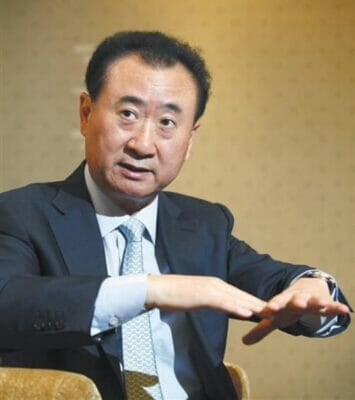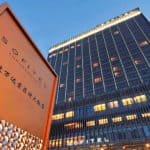
Wang Jianlin’s Wanda is dismantling much of his empire
Dalian Wanda Group saw its revenue tumble by nearly 11 percent last year as the Chinese conglomerate retreated from its global investment and diversification drive to focus on its core property business.
The group’s operating revenues for 2017 dropped 10.8% year-on-year to RMB 227.4 billion ($35.5 billion), according to an announcement on Wanda’s corporate website. Wanda’s stumble came after overall sales for the group fell by 13.9 percent in 2016 in a sign that Wang’s company is struggling to repeat its property successes as it branches out into overseas markets and unfamiliar sectors.
In its most recent statement Wanda attributes this year’s decline mainly to asset sales as well as tourism revenue which it says cannot be captured by the financial statements.
However, revenues for Wanda Commercial Properties, the group’s unlisted real estate unit, also plunged 21 percent year-on-year to RMB 112.5 billion in 2017. This drop followed a 25 percent decrease in revenues RMB 143 billion during 2016, according to a statement at the time.
Sell and Slip Follows Buy and Slide
Wanda sold a huge portfolio of Chinese hotels and theme parks last year, which helped trim the group’s total assets to RMB 700 billion ($109.4 billion) in 2017, a drop of 11.5 percent.
“The year 2017 was the most memorable year for Wanda Group, bringing Wanda a number of challenges,” the company said. Those challenges – which Wanda also describes as “crisis and tribulation” in a Chinese-language statement on WeChat – stemmed from a regulatory campaign in China that forced Wanda to scale back its overseas property purchases and its domestic empire of tourism and hospitality assets.
Wanda Says Only 7% of Assets Are Overseas
In the announcement, Wanda Group addressed concerns about its now-halted overseas investment binge by stating that “domestic assets” still comprised 93 percent of its overall portfolio. The company, China’s leading mall builder, added that it opened 49 new Wanda Plazas – the company’s signature mixed-use complexes including retail, hotel and residential space – and one Wanda Mall in 2017. Twenty-four of these 50 new properties are “asset-light,” in which Wanda partners with a financial backer while collecting a share of the rent.

The Sofitel Wanda Ningbo Hotel is among the hospitality assets Wanda transferred to Guangzhou R&F
The statement comes as Wanda, the Beijing-based conglomerate headed by tycoon Wang Jianlin, moves to sell its sprawling $5 billion overseas property portfolio, spanning the US, Britain and Australia. Just last week, the company retreated from London by selling its troubled flagship project One Nine Elms, reportedly to Guangzhou’s R&F Properties, for £59 million ($81.5 million). Wanda is leaving the city at a loss after picking up the project for £88.8 million ($142 million) in 2013.
Last year, R&F Properties stepped in to buy a horde of 77 hotels from Wanda for RMB 19.9 billion ($2.9 billion), while Tianjin-based Sunac China Holdings acquired a 91 percent stake in 13 of Wanda’s tourism properties for RMB 43.8 billion ($6.5 billion).
Wanda’s efforts to unwind much of its empire followed a regulatory clampdown on the company’s outsized debt and its aggressive expansion into entertainment projects and offshore properties. Chinese president Xi Jinping is reported to have signed off on a funding crackdown on the group’s purchases of overseas cinema chains and yacht makers.
The formerly acquisitive group is also reportedly close to selling its pair of luxury property projects in Australia. Wanda Hotel Development, the conglomerate’s Hong Kong-listed unit, last week suspended trading on the exchange in advance of a “possible very substantial disposal by the Company.”
Wang Jianlin May Regret Branching Out
During 2017, revenues from Dalian Wanda Commercial Properties contributed less than 50 percent of the group’s total revenue, according to the statement, demonstrating the extent to which the developer has spread into new business fields. Entertainment and sports revenue accounted for 28 percent of the total (RMB 63.8 billion) and financial services comprised 14 percent (RMB 32.1 billion).
The revenue figures reflects Wanda’s diversification drive in recent years, as Wang shifted focus from building properties to managing retail and theme park projects and scooping up entertainment firms. That approach has cost Wanda heavily. The company was the fourth-largest real estate developer in China in 2015 but has since dropped to 22nd place, according to data cited by Bloomberg.
Fitch Ratings downgraded Wanda Commercial Properties to a junk rating this month, citing the company’s failure to access offshore financing.
Leave a Reply